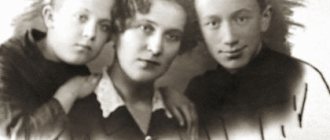“There is nothing easier than, when all the consequences are already known, to return to the beginning of events and give various kinds of assessments,” the now most famous marshal of the Soviet Union, Georgy Zhukov, wrote in his memoirs.
Yes, after many years everything seems so natural, forming into a single plot, where the beginning is visible and the end is clear. But while you live inside the plot, you make decisions, often without knowing how they will come back to haunt you. When we are talking about a person in a high position, then even in his personal life the consequences of any step can be very serious. Such a person is capable of casually breaking someone else's fate... Or his own.
Ustinya: lessons in family life
They say boys learn how to behave with women by watching their mother and father. In the family of the future marshal, all the main issues were decided by the mother, a woman named Ustinha - and this despite the fact that her husband was almost twenty years older. However, Zhukov the father was raised by a lonely widow who took him from an orphanage. So he probably couldn’t imagine any other model than a female leader. This was also reflected in decisions regarding children.
For example, when Zhukov Sr. was about to send his son to study a trade in the city, she decided: no, we’ll wait another year, let it come into force. But Ustinya could not be called a tough woman. She taught her son to peasant labor using completely modern methods. I could say: your age has come to learn how to reap bread... I just bought you a new sickle!
With a new thing, it’s more fun for a child to learn new things - but then they preferred to teach children with blows.
Or the case with the canvas bag. When seven-year-old Egor (as the name Georgiy was abbreviated) was sent to study at a school in a neighboring village, they could not buy him a satchel - they made a bag out of canvas. “Like a beggar!” - the boy was offended. In many families, such complaints were answered with a slap on the head. And the stern Ustinya consoled: they say, it’s a temporary measure. As soon as there is money, of course, there will be a backpack.
And yet the situation in the family was far from idyllic.
Zhukov Sr., leaving for the city to earn money, got used to drinking a bottle, and in the end he began to spend all his earnings in a tavern. His character also became heavier. It happens that he will be offended by something on behalf of his son and, according to the custom of the time, will begin to hit him with a belt: ask for forgiveness. The son is also offended, he is stubborn and does not ask. My father miraculously did not remove the skin with this belt. This is how the future marshal lived, between caress and drag. Once he even ran away from home and hid in a neighbor’s hemp plant for three days.
Food was quietly brought to him by his older sister, with whom Yegor was very close friends. When they wanted to stop letting the girl go to school because of poor academic performance (in their family, school was a holiday, a privilege), he tearfully begged her to have pity. Let him keep going! By the way, this approach (school for a holiday, new clothes for school or for school, if you behave badly, you won’t go to school) later gave an interesting result. Having found himself as an apprentice in the city, Yegor Zhukov studied science with interest with his master’s son - and as a result was able to enroll in evening courses. But if at home the school had been treated as a nuisance (which often happened), Zhukov would not have grown into a marshal.
And yet in the life of George, and then Georgy Konstantinovich, and not Yegorka, the Ustinya that his mother was for his father did not happen. On the contrary, in personal relationships Zhukov always preferred to be in charge and did not allow a single woman to become his only one.
Sasha and Masha
Field wives (MCW) were contemptuously called women who at the front became girlfriends of those for whom their legal spouses were faithfully and sacrificially waiting at home. In fact, this topic is quite delicate. Any psychologist will say: it is completely natural when the fear of death and the feeling that every moment could be the last exacerbates the need to love, to feel someone’s warmth next to you. Even if we are talking about commanders-in-chief, under whose command there were thousands of soldiers and officers, and on whose military talent and confidence the outcome of the battle largely depended.
Information: Georgy Konstantinovich Zhukov is a Soviet commander. Marshal of the Soviet Union (1943), four times Hero of the Soviet Union, holder of two Orders of Victory, and many other Soviet and foreign orders and medals. During the war, he was one of those whom Stalin consulted and whose opinion he sincerely respected.
In 1919, a former Moscow shoemaker, a former cavalry non-commissioned officer, and now a 22-year-old Red Army soldier, Georgy Zhukov, met a woman of the same age , Maria Nikolaevna Volokhova, in a Saratov hospital. Young people have a whirlwind romance.
Alexandra Dievna Zhukova (Zuikova). Photo: wikimedia.org
After some time, the Red Army soldier was forced to go to the front. And there he meets a new passion - Alexandra Dievna Zuikova . But in 1923 in Minsk he is looking for his former love - Maria.
For many years, the military officer had two women close to him - Alexandra and Maria, with whom he apparently lived in almost two houses. Both of them, although it was not wartime, could be called his field wives. They knew about each other and even seemed to put up with this state of affairs. Moreover, he was not formally married to any of them.
Zhukov and Alexandra, 1920s. Photo: wikimedia.org
However, in 1929, first one of them, Alexandra Zuikova, gave birth to Zhukov’s daughter, and then, literally six months later, Maria Volokhova did the same. Zhukov registered both girls as his own, confirming paternity at the registry office.
And then, in order to keep the brave officer near her, Alexandra Zuikova used a method proven for those times: she wrote a statement to the party authorities, demanding that Georgy be forced to marry.
Zhukov categorically refused, but received a party reprimand and a warning. They threatened to expel him from the Bolshevik ranks, which meant automatic dismissal from the army - unless he married Alexandra, who gave birth first.
Zhukov stayed with Alexandra, although he did not register his marriage with her. The mother of his second daughter, Maria, did not put up with this state of affairs and left for another city. Zhukov, as they say, met with both for some time. He could not refuse Mary, although Alexandra bore him another daughter.
Monument to Zhukov in Moscow. Photo: wikimedia.org
Wife from behind the stove
In the twenties, when new laws enshrined women’s civil rights, commissars and commissars were sent throughout Soviet land to explain to women what could no longer be done to them and how exactly their rights would be protected. The educational program was mainly carried out regarding physical and emotional violence, as well as the right to divorce.
The Communist Party itself was called the last line of defense. The educational program bore fruit: women who had long wanted to leave their hateful husbands finally got divorced, and local police and party bodies received statements asking them to pacify their husbands. Do not let them beat you, drink your money away, or take it from your family.
A similar statement was also received from citizen Alexandra Dievna Zuikova. She complained that her actual husband (not listed), citizen Georgy Konstantinovich Zhukov, actually lives in two families. I asked to resolve this situation. The party had a conversation with Georgy Konstantinovich Zhukov.
It was difficult to say which of the two women was the “main” for this citizen. The duration of the relationship was approximately the same. During the war with the Whites, citizen Alexandra Zuikova herself was pulled out from behind the stove by Zhukov in one hut. She was a village teacher. It is not known for certain whether the armed citizen Zhukov asked for consent when taking her as his wife - in those days women were often forced, and it was good if they entered into a marriage that gave at least some kind of stability and status. But since then, Alexandra Dievna has spent many years near citizen Zhukov precisely as a wife. And among his women, she was an exception in her profession.
zhukov 1943.jpg
Alexandra Dievna, daughters: eldest Era, younger Ella, Georgy Konstantinovich Zhukov.
1943 Alexandra Dievna, daughters: elder Era, younger Ella, Georgy Konstantinovich Zhukov. 1943
Read Mark Steinberg’s article “The Private Life of Marshal Zhukov” in Chaika No. 10 (May 15, 2007)
Nevertheless, as we see, even after such repentance before the highest authorities, Zhukov did not part with Lidochka, despite the fact that he lived under the tight cover of the MGB. By the way, for more than 10 years of intimacy with the marshal, Lidochka had at least two occasions to become his legal wife. After all, he was not formally married in those years. And Lidochka had an abortion twice. Zhukov so passionately wanted to have a son that if Lidochka had given birth to him, then, most likely, Zhukov would have formalized his relationship with Zakharova in the registry office. The members of his front-line service team unanimously testify to this in their memoirs.
Lidochka remained with the marshal until the moment when he met military doctor Galina Semenova in Sverdlovsk, fell in love with her and became close to her. Only then did Lidochka leave for Moscow. However, Zhukov did not forget her later. In particular, when he became the Minister of Defense of the USSR, he helped his former mistress get an apartment in the capital.
However, long before this, the so-called “trophy case” unfolded, during which many facts came to light that paint the private life of Marshal Zhukov in far from rosy colors. In 1947, people close to him were arrested: adjutant Semochkin, general for special assignments A. Minyuk and member of the Military Council of the group of forces in Germany, Lieutenant General K. Telegin. Based on their testimony, a case was initiated against the marshal.
In January 1948, SMERSH authorities conducted a secret search at his Moscow apartment and repeated it a few days later at a dacha near Moscow. The valuables found during the searches are amazing. Furs, carpets, tapestries, paintings, sets, furniture sets, antiques... Countless quantities of jewelry lay in suitcases and chests, and were mostly piled up in piles. State Security Chief Viktor Abakumov reported to Stalin: “The apartment and dacha of comrade. Zhukov are essentially antique shops or museums of various valuable exhibits.”
The security officers, however, did not calm down; they were looking for a certain suitcase, according to their information, filled to the brim with jewelry. They also looked for him in Odessa, they looked for him at Zhukov’s in Moscow, when he returned there on January 10, 1948, they thought that the marshal was carrying the notorious suitcase with him. But they didn’t find it. According to the author of the book “Unknown Zhukov, a portrait without retouching” Boris Sokolov, “This suitcase was discovered in the possession of the former nanny Lydia Ruslanova during the searches carried out when General Kryukov and his wife, the famous singer Lydia Ruslanova, were arrested in the fall of 1948. In the suitcase they found 208 large diamonds, many emeralds, sapphires, pearls, platinum and gold unique jewelry.”
Medical lover
Citizen Zhukov also began cohabiting with citizen Maria Volokhova as his wife during the Civil War, after ending up in the hospital. She was a nurse, she nursed him, and citizen Zhukov, without jokes, considered her his wife in front of his comrades. They were separated for some time by his departure to the front. As a result, when the war ended, citizen Zhukov found himself the husband of two women at once and did not find any desire to choose only one in himself. Still, under pressure from the party, he had to make a choice.
Marshal Georgy Konstantinovich Zhukov with his wife Galina Alexandrovna
Nurse Volokhova left, taking with her her little daughter, Margarita, who she shared with Zhukov, and almost immediately married someone else. The “winner” had to observe her husband’s infidelity more than once, and only in 1953 did she, from an actual wife, also become an official wife. By that time, she had already raised two daughters, Era and Ella, on their feet.
Georgy Konstantinovich, it seems, tasted the delights of bigamy and later got himself another additional wife.
Her name was Lydia Zakharova. A front-line paramedic, thin, fragile, intelligent, and could not tolerate swear words. She responded to Zhukov’s love with all her heart - after all, he was a renowned officer, a defender of the Fatherland, and he so touchingly took care of her in the mud of the front. Lidochka Zakharova ran after Georgiy Konstantinovich wherever he went, and especially where it was dangerous - in case he was wounded! Then she will bandage it immediately. It was as if she forgot that she herself could be wounded.
In total, she spent nine years with her second wives, from the first autumn of war until the fiftieth year. She did not give children to Zhukov. According to rumors, at the front, for obvious reasons, she chose an abortion, and with the old level of medicine, infertility was a complication after it. After the war, the marshal settled her in Moscow not far from him. Then he went with her to Odessa - they lived together there. But when the main wife of this peculiar harem arrived, Lydia left bashfully. And she probably suffered from the humiliation of her role.
The situation was again resolved by Alexandra Dievna - and again through the party. Remove, she demanded, this paramedic from my husband. The party thought and removed the paramedic from his post, and then left it to her and the illustrious marshal to decide.
Then citizens Zhukov and Zakharova left for Sverdlovsk, leaving citizen Zuikova without even the appearance of a husband. True, after some time, Georgy Konstantinovich fell in love with another representative of the medical profession, even younger than Lydia. Her name was Galina Semyonova. Georgy Konstantinovich’s heart attack introduced them - she arrived by ambulance. Having looked at Zhukov’s stormy, as always, courtship of Semyonova, Zakharova packed her things and left for Moscow. She realized that she would never be the only one for this person.
But the official wife - the wife from under the stove - wrote to the party about Galina Semyonova: remove her, remove her! But in the end, Zhukov divorced the eldest wife of the harem, and married the younger one. Soon after this, the eldest suffered a stroke: she lived only two years after the cruel disappointment. After all, what held her back was probably the fact that even though she never had a real husband, the one who chose her alone, she at least had a decent status. To compensate for such a life...
Galina Semyonova, who arrived by ambulance, also did not live long in marriage, six years. Burned out from breast cancer. Zhukov followed into the grave. Another heart attack.
Marshal Zhukov's daughters cannot share their father's inheritance
Fate raised him to the very pinnacle of glory and threw him into undeserved disgrace; she generously endowed him with the love of the people and the hatred of his enemies. They erected monuments to him for his genius as a commander and threw mud at him because he allegedly fought not with skill, but with numbers. But no matter how anyone tries to rewrite history today, Marshal Zhukov’s services to Russia are indisputable.
He was and remains a national hero, whose name is on a par with the legendary commanders Suvorov and Kutuzov. He is the man who defeated Hitler.
But the further the Great Patriotic War goes, the more obvious it is that Georgy Konstantinovich Zhukov was not only the great Marshal of Victory, repeatedly cast in bronze, but also an ordinary earthly person who is never one-color. That is probably why the controversy around his name still does not subside.
Khrushchev was afraid of him
“Now many are trying to discredit the name of Zhukov,” says Alexey PAVLIKOV, deputy chairman of the Committee in Memory of Marshal of the Soviet Union Georgy Zhukov, “I think this is due to the fact that someone really wants to reconsider the results of the Second World War.” For example, the lie is often exaggerated that Zhukov killed a million soldiers on the Seelow Heights near Berlin. Yes, in the entire history of the most difficult Berlin operation, our losses amounted to 78 thousand 250 people. There are still periodic conversations that Zhukov took a lot of goods from Germany. But it was a planned action to fabricate a case against Zhukov. And during searches at the apartment and dacha, they were looking for a mythical chest of jewelry that did not exist in nature. Yes, like a normal person, he also made mistakes. But they pale in comparison to how great his merits and fame are throughout the world. It is no coincidence that at one time there was such a joke: if Zhukov had run for president of the United States, he would have won the election...
However, after the war, when there was no longer a need for Zhukov as a commander, he was relegated to secondary roles. First to command the Odessa Military District, then the Ural Military District. For only two years, from 1955 to 1957, he rightfully held the post of Minister of Defense.
“Few people know, but as Minister of Defense, Zhukov was actively involved in the problems of repressed people and prisoners of war,” says Pavlikov. “He even wanted to equate the latter with front-line soldiers. I am sure that Khrushchev, who suffered no less blood than Beria, was afraid of such activity by Zhukov and feared his limitless authority. In addition, Zhukov had many envious people. That is why almost all of his associates took part in the political execution with the exception of Marshal Vasilevsky. Zhukov spent most of the post-war period in disgrace. From 1946 to 1953 and from 1957 until the end of his life in 1974. Zhukov took the resignation very hard. I addressed the Central Committee and personally Khrushchev with a request to provide any work. But everything was in vain...
Two families - four daughters
Zhukov's private life is also ambiguous. She was stormy, confused, happy and tragic. Despite the black-and-white Soviet principles and public showdowns and discussions of his moral character, Zhukov was not afraid to live as his loving male heart suggested. Two official marriages, several relationships on the side, eight years of life in two families and four daughters, the relationship between which was not easy both before his death and after. And although they all still bear their father’s surname, they were never able to peacefully use it as a great inheritance. And all because one of them - the illegitimate Margarita - immediately after Zhukov’s funeral began to excessively flaunt her father’s name. The irony is that for the first 17 years of her life she bore a completely different last name. Zhukov, however, officially recognized Margarita, provided her with a Moscow apartment, and even mentioned her in his will. Although she never lived under the same roof with the legendary marshal. That didn’t stop her from traveling around the world after Zhukov’s death with stories about the life of her great father. And 13 years ago, Margarita also created the Marshal Zhukov public foundation.
Two daughters from Zhukov’s first marriage, Era and Ella, initially tried to fight their too quick relative, writing letters to the authorities that she was making up tall tales. But they couldn't stop her. Now they don't even want to hear about it.
Zhukov’s youngest daughter Maria shares the same opinion. In a conversation with me, she immediately snapped:
“This woman has nothing to do with our family.”
For Maria herself, Zhukov’s beloved daughter, life was also not easy. In the year of her birth, in 1957, her father was still married to his first wife, Alexandra Dievna. He was able to get a divorce only in 1965. Immediately after this, the 69-year-old marshal finally married Maria’s mother, Galina Semenova, whom he met and fell in love with in the early 50s in Sverdlovsk. She was 30 years younger than him.
The first wife, who tried to keep her husband by any means, including letters to the Central Committee, Khrushchev, was never able to come to terms with the offensive loss. Three years after the divorce, she died of a stroke.
Galina was destined to become the last and (as some biographers of Zhukov write) the marshal’s strongest love. However, having given great happiness in his declining years, fate mercilessly took it away in the end. In 1973, Galina died of cancer. Six months later, Zhukov himself passed away. The next day, Maria turned only 17 years old.
And two years ago, Maria Zhukova, as her father once predicted, wrote a book and called it “Marshal Zhukov - my father.” The book was published by the Sretensky Monastery publishing house, where Maria works as a literary editor. By the way, the sisters evaluate Mary’s coming to God differently. Era and Ella - with understanding, Margarita - with sarcasm: “Atonement for the sins of the mother.”
Meanwhile, Maria Georgievna painted a completely unexpected - close to God - image of Zhukov. And in the annotation to the book you can read that “the great commander managed to preserve the heart of an Orthodox Christian in godless times.”
Wedding and family life
After the divorce, Galina and Georgy formalized their relationship and got married. Now a time of peace has come in their lives, Galina has become the legal wife of Marshal Zhukov. Separating even for a short time, Georgy Zhukov and his wife wrote letters to each other with tender, sincere declarations of love. These letters were published in a book by their daughter Maria. The children of Georgy Konstantinovich, despite all the events occurring in his life, were always financially secure and received a good education.
Georgy Zhukov and his wife Galina lived a happy life until Galina’s illness and death separated them. After the death of his wife, Georgy Zhukov was worried and because of this he had a stroke, then a heart attack, after which he fell into a coma and died. He was not buried next to his wife, as he wanted, but was cremated, and his ashes were buried in the Kremlin wall.
Perhaps interesting: the wife of Roman Babayan, the wife of Dmitry Breytenbicher.
Georgy Zhukov's first daughter Margarita
Georgy Konstantinovich Zhukov is a great Soviet commander.
His services to his homeland are undeniable. Georgy Konstantinovich was called “Marshal of Victory.” Zhukov's personal life deserves special attention. It was stormy, fulfilling and at the same time tragic. Despite strict Soviet moral principles, the military leader was not afraid to live the way he wanted. He had two official marriages and several affairs on the side. Zhukov's first great love was Maria Nikolaevna Volokhova. He met her during the Civil War in 1919. After returning from the front, Georgy Konstantinovich maintained a relationship with a young nurse, but after a while he began dating another woman. For six years he was torn between Maria Volokhova and Alexandra Zuikova. In 1929, Maria gave birth to a daughter, Margarita, from Zhukov. The woman soon got tired of the constant rivalry with Alexandra and married someone else, giving her daughter the name of her new husband. Only after his death did Maria reveal who the girl’s father really was.
Margarita was recognized by Zhukov during his lifetime. The marshal wrote it into his will. But only after the death of Georgy Konstantinovich she decided to change her surname and spoke publicly about her relationship with the great commander. In 1993, Maria Georgievna organized the Marshal Zhukov Foundation. The legitimate sisters did not like this initiative. They repeatedly complained, wrote letters to senior management and accused the relative of slander. Margarita Georgievna died in 2010.











